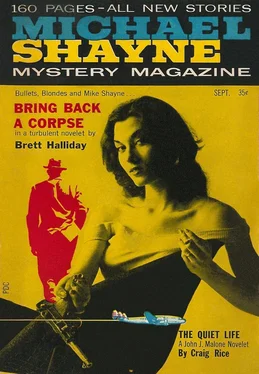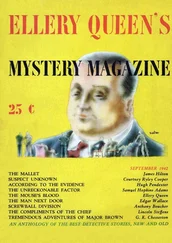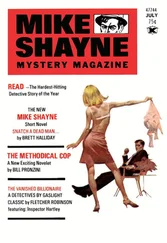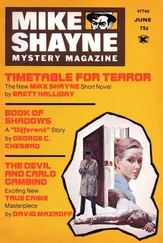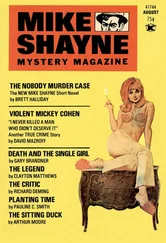Robert Bloch - Michael Shayne Mystery Magazine. Vol. 1, No. 1. September 1956
Здесь есть возможность читать онлайн «Robert Bloch - Michael Shayne Mystery Magazine. Vol. 1, No. 1. September 1956» весь текст электронной книги совершенно бесплатно (целиком полную версию без сокращений). В некоторых случаях можно слушать аудио, скачать через торрент в формате fb2 и присутствует краткое содержание. Город: New York, Год выпуска: 1956, Издательство: Renown Publications, Жанр: Детектив, на английском языке. Описание произведения, (предисловие) а так же отзывы посетителей доступны на портале библиотеки ЛибКат.
- Название:Michael Shayne Mystery Magazine. Vol. 1, No. 1. September 1956
- Автор:
- Издательство:Renown Publications
- Жанр:
- Год:1956
- Город:New York
- ISBN:нет данных
- Рейтинг книги:3 / 5. Голосов: 1
-
Избранное:Добавить в избранное
- Отзывы:
-
Ваша оценка:
- 60
- 1
- 2
- 3
- 4
- 5
Michael Shayne Mystery Magazine. Vol. 1, No. 1. September 1956: краткое содержание, описание и аннотация
Предлагаем к чтению аннотацию, описание, краткое содержание или предисловие (зависит от того, что написал сам автор книги «Michael Shayne Mystery Magazine. Vol. 1, No. 1. September 1956»). Если вы не нашли необходимую информацию о книге — напишите в комментариях, мы постараемся отыскать её.
Michael Shayne Mystery Magazine. Vol. 1, No. 1. September 1956 — читать онлайн бесплатно полную книгу (весь текст) целиком
Ниже представлен текст книги, разбитый по страницам. Система сохранения места последней прочитанной страницы, позволяет с удобством читать онлайн бесплатно книгу «Michael Shayne Mystery Magazine. Vol. 1, No. 1. September 1956», без необходимости каждый раз заново искать на чём Вы остановились. Поставьте закладку, и сможете в любой момент перейти на страницу, на которой закончили чтение.
Интервал:
Закладка:
As always, when he made the change from one identity to another, he paused before the first mirror that caught his eye. The hesitation was brief, hardly more than a flicker — it was as though he half-expected to find revealed, literally, a new and totally different man. It was as if he expected so see features even more forceful and magnetic, if that were possible, than they had been before.
This time, the mirror was a rectangle in a vending machine. Robert was a little disappointed that the reflection showed no marked change. His face, in spite of its forcefulness, was smooth, oval, a little asymmetrical, just as Richard’s had been. The magnetic eyes that peered back at him from beneath wisps of sandy eyebrows were still pale-blue and grey, much like those of an alert rooster. Even the hair — he removed his hat to make sure — was a downy pink, and still scarce.
Robert D. looked like Richard C. He also looked like Raymond A. Brown of Hartford, and Reynold B. Brown of Boston. In any identity, for that matter, he knew that he resembled a great many men people find it hard to remember.
Then what made him so irresistible to women?
Robert shrugged, puzzled but complacent, and moved away. Probably, he decided, when he stared hard at himself in the mirror, his inner personality simply went into aloof, sensitive retirement.
It was convenient, of course, that his appearance was not too remarkable. It was much, much safer, to be inconspicuous. He looked like any respectable, married, thirty-nine-year-old businessman, hard-working and moderately successful — and why shouldn’t he? The description was true.
There was only one detail in this picture of himself that did not quite satisfy him. His success, in a highly speculative investment field, was far too moderate. At least, it had been thus far, in the fifteen years since his first marriage, when Lucille’s financial assets gave him the means to begin dealing on a large scale in his favorite securities.
The securities he bought were betting slips, in the horse-racing market. Brown — all four of him — did not exactly play the horses. It had long ceased to be play. He studied, he computed, he doped according to the rules of his system, and then made shrewd investments. It was full-time employment, too. No system is so perfect it can’t be improved, he often told himself, after which, he set about computing and doping some more, seeking to plug up all possible leaks, leaks that stubbornly reappeared in his formulae.
On his way to lunch, the real start of his business day, he bought every form-sheet and newspaper with information about the fluctuations that would take place that afternoon, as soon as the tracks opened. In the quiet restaurant where he dined, he was a familiar figure, with his charts, his notes, his record-books.
The waitress who set his place asked him, “Feeling lucky today, Mr. Brown? I could certainly use a long shot, myself, if you’ve got something sure.”
Questions like this made him wince, inwardly, as hopelessly amateurish. How could anyone speak of luck, a long shot and a sure thing, all in the same breath? But he smiled amiably and tried not to sound condescending.
“Maybe. If I find something really hot, I’ll let you know.”
But the waitress scarcely heard him, her mind skipping ahead on a more facetious tangent. “What I wonder about customers doping the horses. Well, maybe you can. But I’d like to see you try something tough, like making book on people. Be honest, Mr. Brown, sometimes you can’t even figure your own wife.”
Brown began a firm reply. “On the contrary,” he said, and then just as firmly stopped.
Without even asking, or caring, which wife the waitress had in mind, the subject was taboo. It was a sore point, besides. He had been about to state that just the opposite was true. His wives ran true to form, he had found, and he only wished — how deeply and painfully he wished! — he could say the same for horses.
But the subject was too distressing to talk about. It would be unwise to speak with too much authority. By this time, the waitress had given him a menu, and gone.
It was a fact, though — and a sad one — that, as Raymond A. Brown, he had suffered reverses in his first two years of marriage with Lucille, and they had cost him nearly all of the $27,000 with which she had opened their joint bank account. Joint bank accounts, like joint ownership, of property, Brown regarded surely among man’s finest invention. There had been a dark period when, if Lucille had thoughtlessly written a check, it was quite possible that their marriage might actually have exploded.
Fortunately, he had grown very fond of a new and recently widowed acquaintance, a lady well worthy of becoming his wife. This was Helen, and she had brought a comfortable $40,000 to her joint bank account with Reynold B. Brown. The name, like the initial, was chosen as an orderly help to Brown’s memory — at that time, he had had no intention of working his way through the alphabet. So, with Helen’s unconscious but timely backing, he had recapitalized and refinanced all around. Naturally of course, he had devoted his own added insight toward a few final, vitally necessary improvements in the system.
These improvements had helped — but not enough.
His losses had been considerably slowed down. Investments that showed splendid results almost equalled those that failed. There was one year, indeed, when his accounts showed that he had broken practically even.
All the same, his resources were again depleted when he met Marion, and she, too, was welcomed into the firm — though not in those exact words. Her $18,000 contribution to a joint bank account with Richard C. Brown had been modest, but timely and, for a while, it seemed as though the tide had finally turned.
But it hadn’t turned enough — not quite. He met the gay, ornamental, chaotic Bernice, and there came a day — the day he learned she had recently inherited $20,000 — when he asked her, too, if she would like to be his helpmate. This was how he became Robert D. Brown, sitting among the financial guides and investment paraphernalia spread out on the table of a quiet Philadelphia restaurant.
This was why he regretted that his success, thus far, had been so moderate. The tide had now, at last, definitely turned. But there were still precarious days, uncertain weeks, ahead.
This was why, while he concentrated on his chops and salad and coffee, he also pondered the mysteries of the alphabet. Would there ever be a Rudolf E. Brown? If so, what would the fellow’s wife be like? He couldn’t help wondering.
He finished lunch and, afterward, went on with his calculations, making the serious decisions of the day. When he had them, as he paid the bill and tipped the waitress, he remembered something.
“Bold Magician in the sixth at Bowie,” he told her. “That’s today’s best.”
“What?”
It was apparent she had forgotten their earlier talk, Brown merely repeated the name of the horse, smiling with professional reserve.
He had a lot to do that afternoon. Place his bets — collect on yesterday’s single winner — call on three or four drugstores with those tiresome cosmetics. This last he considered a waste of time, save for use as an alibi he hoped he would never need.
III
It was seven o’clock that evening when Brown arrived at the big, solid apartment building in Newark, where he and Bernice had established residence. He did not like it, though he felt no fear, at sight of a police prowl-car, an ambulance and other official cars, drawn up before the entrance, with a knot of spectators gathered in solemn curiosity on the walk outside.
But he could not down a wave of uneasiness when he exchanged a nod with the elevator man, then received a sudden, startled glance of recognition, quickly veiled and averted. The attendants usually spoke after one of Brown’s trips — and his suitcase showed he was just returning from one. Now they ascended in silence to the fourth floor.
Читать дальшеИнтервал:
Закладка:
Похожие книги на «Michael Shayne Mystery Magazine. Vol. 1, No. 1. September 1956»
Представляем Вашему вниманию похожие книги на «Michael Shayne Mystery Magazine. Vol. 1, No. 1. September 1956» списком для выбора. Мы отобрали схожую по названию и смыслу литературу в надежде предоставить читателям больше вариантов отыскать новые, интересные, ещё непрочитанные произведения.
Обсуждение, отзывы о книге «Michael Shayne Mystery Magazine. Vol. 1, No. 1. September 1956» и просто собственные мнения читателей. Оставьте ваши комментарии, напишите, что Вы думаете о произведении, его смысле или главных героях. Укажите что конкретно понравилось, а что нет, и почему Вы так считаете.
